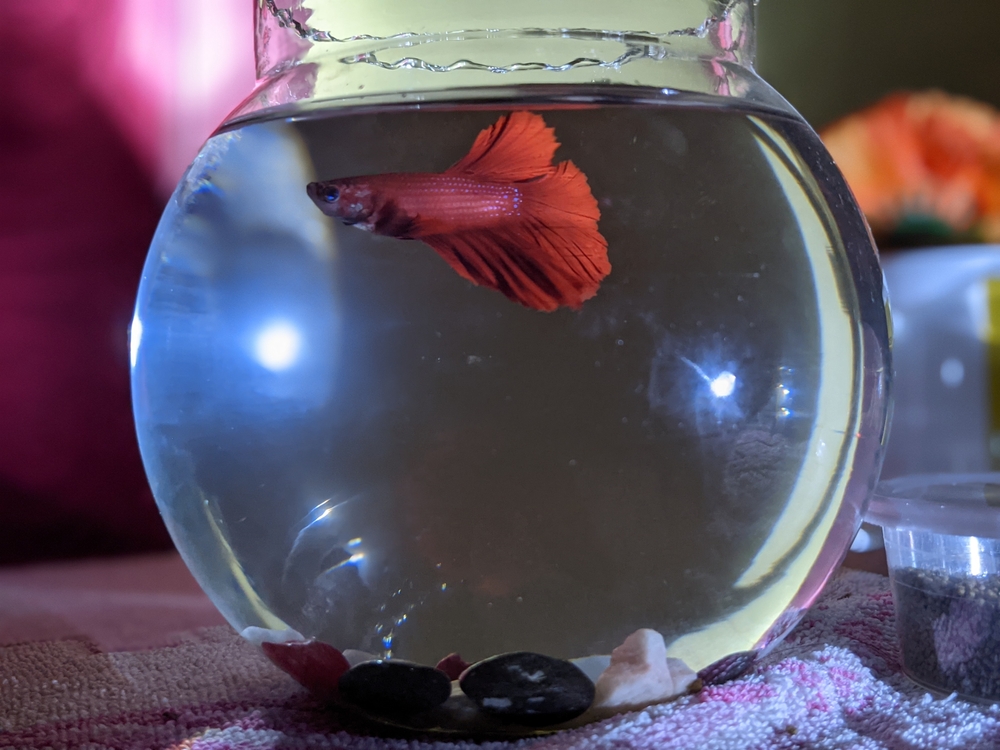Betta fish, known for their bright colors and flowing fins, are popular pets that require specific care to maintain their health. When setting up their environment, one of the main concerns is the water they live in.
The type of water in your fish tank plays a major role in your betta fish’s overall health and well-being; a drop in water quality spells great distress for your fish.
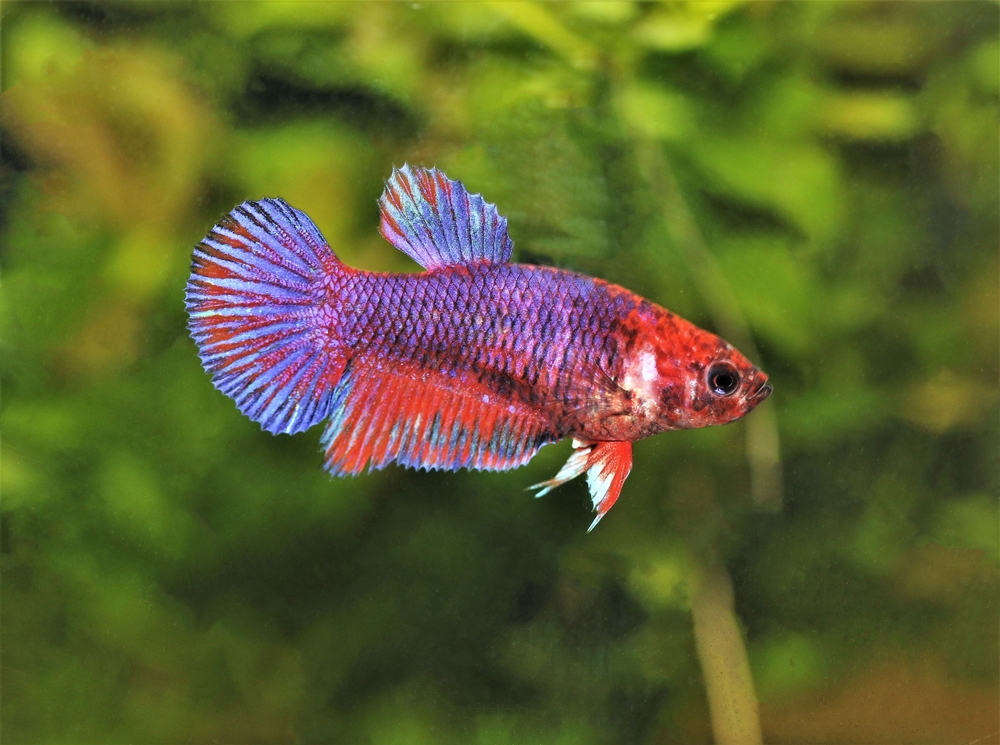
In light of this, this guide will establish a clear standing on the truth behind betta fish’s survivability in tap water. It exposes the potential risks lurking in tap water, the vital steps to make it safe for your betta, and why keeping optimal water conditions is crucial for their well-being. So, follow closely, and let’s unravel the mysteries together.
Check out these other top picks in this category:
- How Much to Feed Betta Fish for Optimal Health and Longevity
- Can Male and Female Betta Live Together?
- Betta Fish Lifespan: The Essential Guide to a Healthy Siamese Fighting Fish
Contents
Understanding Betta Fish Natural Habitat
It is vital to fully understand the natural habitat of betta fish since it will help you to provide the best care when you have them in captivity. Bettas hail from Southeast Asia’s lush, warm waters, where they thrive in rice paddies, slow-moving streams, and shallow ponds.
Recognizing the environment from which they originate enables aquarists to simulate similar conditions in a home aquarium.
In their natural habitat, betta fish experience a range of water parameters crucial for their well-being. The consistency of these conditions, such as temperature, pH levels, and water flow, plays a significant role in betta fish’s health and stress levels.
Your betta fish will be able to experience its wild environment by replicating these elements as closely as possible in a tank environment. In trying to replicate your betta’s natural environment, you must keep a few things in mind, including:
- Stability of water temperature
- Gentle water flow
- Soft, acidic water conditions
Typical Water Parameters in the Wild
Betta fish, being native to a tropical climate, are accustomed to warm water with temperatures ranging from 76°F to 82°F. The water in their natural habitat generally has a slightly acidic pH, typically around 6 to 7. They benefit from a mixture of oxygen levels and the presence of tannins released from fallen leaves and other organic materials.
These tannins can soften the water and are thought to have anti-bacterial properties, contributing to the fish’s health. To give your betta fish the life it deserves, you must understand how its natural habitat works and strive to replicate the natural water parameters that betta fish encounter in the wild.
The Science of Tap Water and Its Effects on Betta Fish
Before introducing tap water to a betta fish habitat, you want to understand the specific characteristics of tap water that may affect the betta’s health. It is worth noting that tap water is treated to make them safe for human consumption. But how does this treatment influence your betta’s chances of survival?
Chlorine and Chloramine Removal
Chlorine and chloramines are commonly used in municipal water systems to kill harmful bacteria and other pathogens. However, these chemicals are toxic to betta fish, causing damage to their gills and skin. You can use water conditioners specifically designed for aquariums to handle chlorine issues.
Heavy Metals and Other Harmful Contaminants
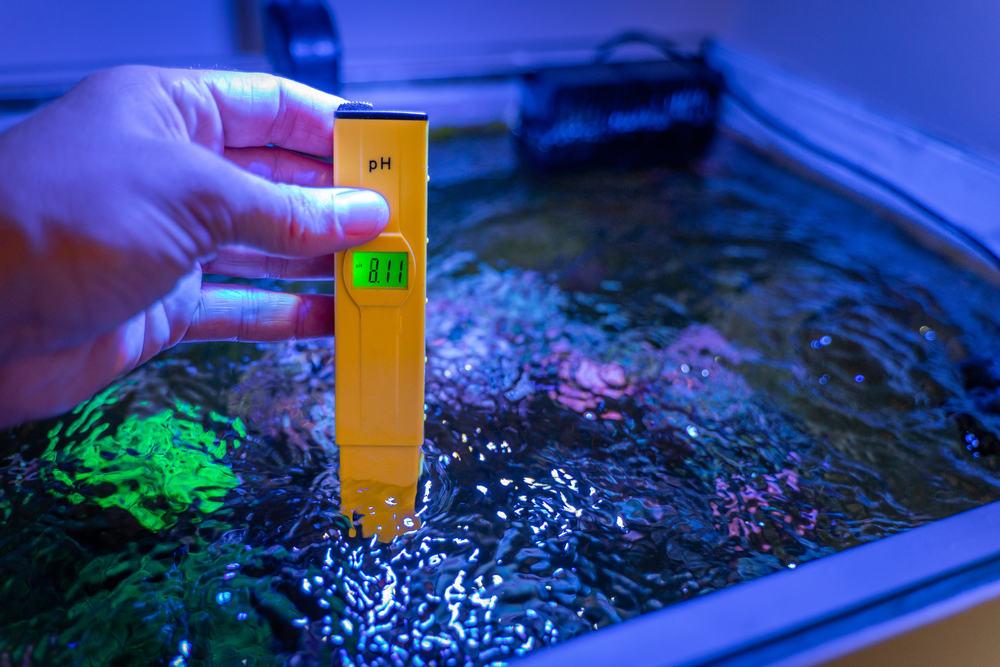
Untreated tap water may contain heavy metals like lead, copper, and zinc, which can lead to metal toxicity in betta fish, impairing their health or even proving fatal.
Additionally, contaminants such as pesticides pose a risk. Therefore, a water conditioner is also necessary to bind these elements, reducing their toxicity. Plus, regular water quality testing can keep heavy metal levels in check.
The Impact of pH and Temperature on Betta Health
Ensuring the optimal environment for your betta fish goes beyond just providing a tank and some water. Did you know that the pH level of the water can significantly impact your betta’s well-being?
Betta fish prefer a pH level close to 7, which is neutral and mimics their natural habitat. Tap water, on the other hand, often has a different pH, which can cause stress and weaken your betta’s immune system.
But that’s not all. Betta fish are also quite particular about their water temperature. They thrive in stable temperatures between 76°F and 82°F. Fluctuations outside of this range can be detrimental to their health. So, investing in an aquarium heater with a reliable thermostat is essential to keep their environment consistent and comfortable.
By understanding and managing these parameters in tap water, you’re taking the proper steps to maintain a healthy and safe environment for your betta fish to thrive. As such, you must make the right investments to provide your betta fish a haven.
Role of Water Conditioners in Fish Health
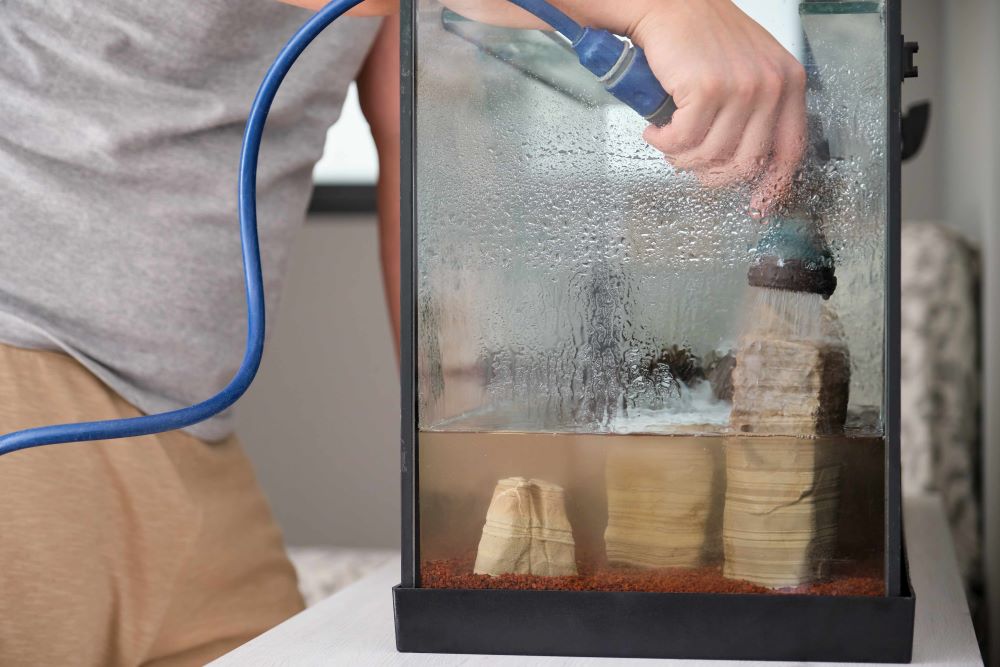
Water conditioners are a key part of the aquarium if you want to create a safe and healthy environment for bettas, especially with tap water usage. Let’s dissect the importance of water conditioners as we proceed in this section.
Choosing the Right Water Conditioner
When selecting a water conditioner, it is important to look for a product that neutralizes chlorine and chloramines and binds heavy metals in the water. In addition, you should check conditioners with beneficial bacteria formulas to establish healthy biological filtration in the aquarium.
- Neutralization: Targets chlorine, chloramines, and heavy metals.
- Biological Boost: Adds beneficial bacteria for a robust ecosystem.
How to Treat Tap Water with Conditioners
To ensure your betta fish lives a long and healthy life in tap water, you must follow specific guidelines when adding water conditioners. This includes paying attention to the specific dosage instructions on the product.
Proper waiting time is critical, as fish are susceptible to added chemicals. Therefore, following the manufacturer’s instructions on how long you need to wait is very important. In a nutshell, you should follow the following steps when adding water conditioners.
- Measure: Accurately dose according to your aquarium size.
- Mix: Stir water to disperse the conditioner evenly.
- Wait: Give the chemical reaction time to complete before adding fish.
Patience and precision in selecting the right water conditioner and treating tap water are integral to fostering a healthy habitat for fish.
Temperature Regulation and Monitoring
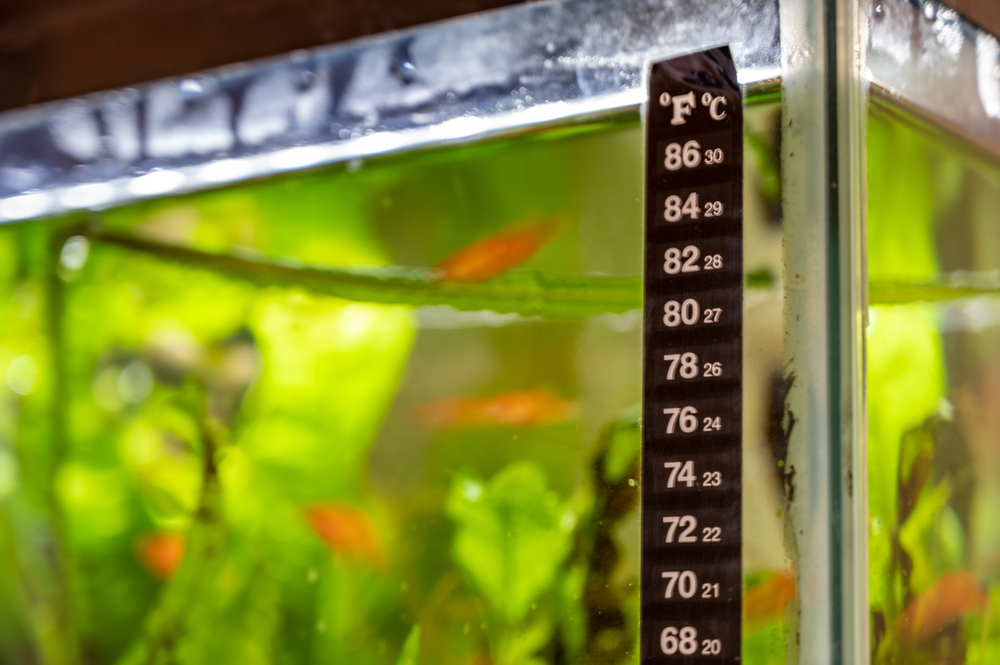
Ensuring stable water temperature is crucial for the optimal health of betta fish. You must put things in place to help keep temperatures between 76°F and 82°F because anything too high or low may be fatal. As such, a reliable heater will come in handy to ensure the water stays consistently within the required range.
One can always track the changes using a reliable aquarium thermometer to detect irregularities or fluctuations. With the appropriate setup, prompt adjustments are made to the heater to halt temperature changes that could stress the fish.
Understanding Water Hardness and Its Impact
Water hardness, reflecting the concentration of calcium and magnesium in the water, directly affects betta fish. Ideally, bettas thrive in water with a general hardness (GH) range of 3-4 dGH (50-70 ppm) and carbonate hardness (KH) from 2-5 dKH (35-90 ppm), conditions that ensure a safe environment for their unique physiology.
Variations in water hardness can disrupt the delicate balance of minerals, potentially causing stress and health issues for betta fish. Therefore, it’s crucial to maintain the ideal hardness levels to ensure these beautiful creatures’ overall health and vitality, especially in tap water cases.
Alternatives to Tap Water for Betta Aquariums
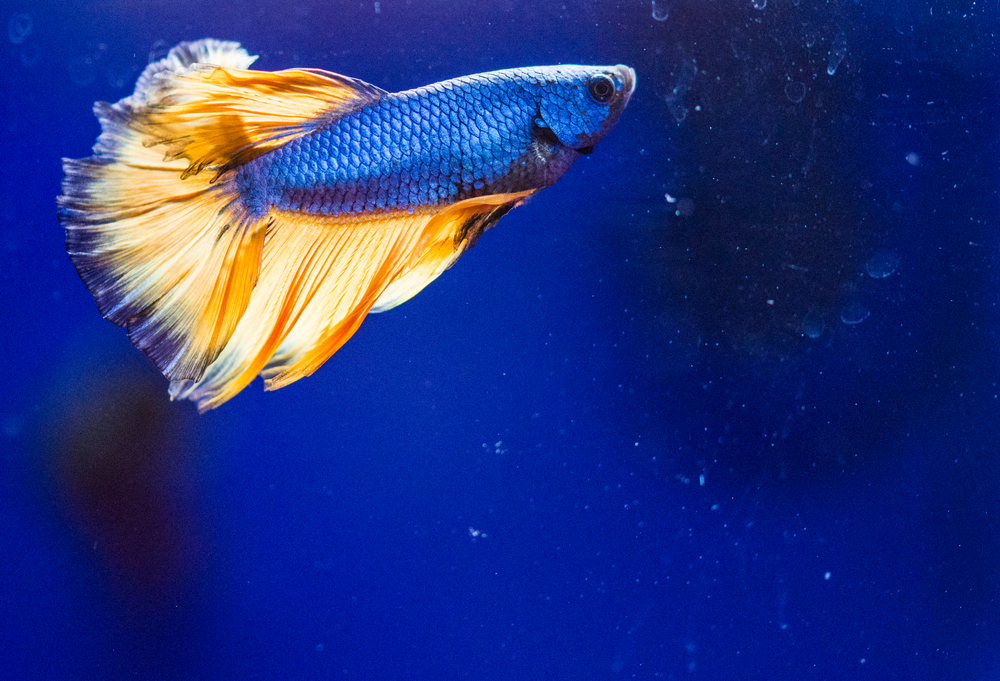
We’ve established that choosing the right type of water is necessary for creating the ideal aquarium for your bettas. While tape water is an option, it often contains chemicals that may affect the fish. For this reason, let’s review other water sources like distilled, spring, reverse osmosis, or bottled water.
Pros and Cons of Different Water Sources
Distilled Water:
- Pros: Distilled water is free from contaminants and heavy metals, making it a clean slate for conditioning specific to betta fish needs.
- Cons: It lacks essential minerals required for betta fish health; hence, mineral additives might be necessary.
Spring Water:
- Pros: Spring water often contains a balance of minerals beneficial for bettas.
- Cons: The mineral content can vary, so consistent water quality might be a challenge.
Bottled Water:
- Pros: Convenient to use, and quality tends to be consistent.
- Cons: It can be costly over time and may still require conditioning.
Reverse Osmosis Water:
- Pros: Reverse osmosis water is very pure, akin to distilled water, excellent for controlling the exact water composition.
- Cons: Similar to distilled, it lacks minerals, which you will need to add back in.
Well Water:
- Pros: It’s a natural source and may be similar in composition to betta’s native habitat.
- Cons: Can contain contaminants or heavy metals and typically requires testing and conditioning.
When to Use Distilled or Bottled Water
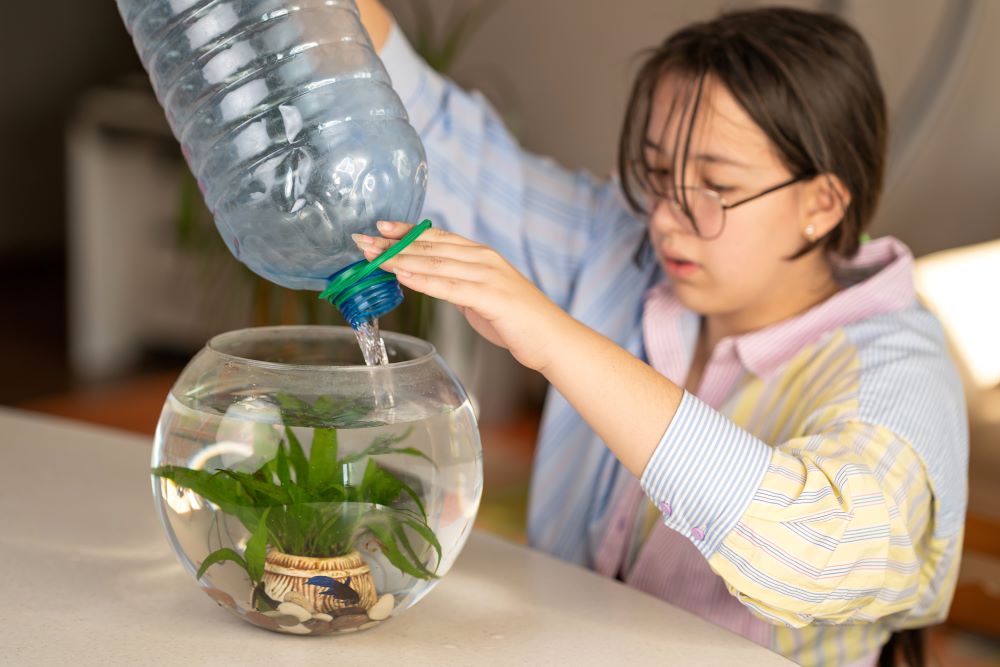
Distilled water becomes necessary when the tank’s chemistry needs to be completely controlled. Complete control over water chemistry means fine-tuning every aspect without compromise. However, it’s not merely a pour-and-go situation. As such, you must add some essential minerals and condition the distilled water properly before your colorful betta takes a plunge.
Bottled water, however, usually comes in handy when laziness creeps in, and you’re just looking for more convenient ways. However, convenience does not imply compromising the quality of water and, by extension, the health of your betta.
Look out for the labels to detect any healthy or toxic substances. For example, high sodium levels may greatly harm your bettas. Bettas are easy to care for, but they have high standards anyway.
Maintaining Water Conditions Through Regular Water Changes

You need to understand that your betta’s health and well-being heavily depend on your ability to maintain the right conditions in their habitat. One way to do this is to carry out routine water changes.
This allows you to control water parameters like pH levels, hardness, nitrates, and the presence of toxic substances such as ammonia. Routinely replacing a portion of the aquarium water helps keep the aquarium environment clean and rich in oxygen.
How Often Are Water Changes Required in Betta Fish Tanks
You want to change about 25-50% of your tank water weekly to maintain optimal water quality. This frequency can help prevent the buildup of harmful substances and maintain stable water conditions.
Factors such as tank size, number of fish, and the presence of live plants can influence the specific scheduling of water changes. For example, if you have a smaller tank or a higher bioload, you should change the water more frequently.
Water Testing Kits and Monitoring
Water testing kits allows you as a fish keepers to carry out routine water parameter checks easily. Typical kits include testers for pH, hardness, ammonia, nitrates, and nitrites. Bettas prefer water with characteristics typically present in neutral pH conditions, so a pH level of 7 is more suitable. The optimum hardness for bettas would be between 5 and 20dH.
Nitrites and ammonia levels must be kept as close to zero as possible, and nitrates should not exceed 20 ppm. In scenarios where nitrate levels are above 20 ppm, remove them using water changes.
As soon as the problem occurs, an urgent decision is needed to resolve it. Getting it done right away is the best idea. If it becomes overwhelming or something beyond your strength, don’t hesitate to reach out to the expertise of a staff member from a nearby pet store.
Conclusion
Ensuring the well-being of your fish requires special attention to water quality. So, can betta fish survive in tap water? Yes! But you must put a few things in place to ensure they live in good health and are happy.
While tap water alone may harm your bettas, proper water conditioning may help them survive. However, water conditioners may not give you all you want. So, for maximum results, prioritize investing in quality water testing kits, heaters, and filters and keeping a consistent water-changing schedule. All these make your betta’s life worth living in tap water.
Frequently Asked Questions
Understanding water conditions is important for safeguarding your betta’s health. Here are some specific questions frequently asked by betta fish owners.
How long can betta fish live in untreated tap water?
Betta fish are sensitive to the chemicals commonly found in tap water, such as chlorine. If exposed to untreated tap water, it can lead to health issues and potentially be lethal in a short amount of time. Therefore, untreated tap water should be avoided.
Is it safe for betta fish to live in water directly from the tap without being treated?
It is unsafe for betta fish to live in water directly from the tap because it can contain harmful substances like chlorine and chloramines. These chemicals must be neutralized, and water conditioning is necessary before the water can be considered safe.
What are the necessary water conditions for the survival of betta fish?
Bettas are very sensitive to water conditions; the optimum water temperatures are within the 76°F to 82°F range and a pH value between 6.5 and 7.5. The species also favors clean, ammonia-free water with low nitrite and nitrate levels.
Do betta fish require water conditioners to remain healthy in a home aquarium?
Yes, you need water conditioners to neutralize harmful chemicals in tap water and ensure the fish’s health and longevity within a home aquarium.
Can betta fish thrive in a tank environment without a filter?
While betta fish can survive in still water, a filter can greatly improve their habitat by maintaining water cleanliness and proper oxygenation, which are essential for their well-being.
What type of water setup is recommended for keeping betta fish healthy?
For keeping betta fish healthy, a water setup with consistent ideal water parameters, a water conditioner to neutralize harmful compounds, and a filtration system to keep the environment clean and oxygenated is recommended.

Ian Sterling, founder of Fishlab.com, began his aquarium journey over 30 years ago, driven by a deep fascination for fish and their diverse personalities. His website, Fishlab.com, is dedicated to making fishkeeping accessible and enjoyable, offering beginner-friendly guidance, expert insights, and a community for aquarists to connect and share experiences.


